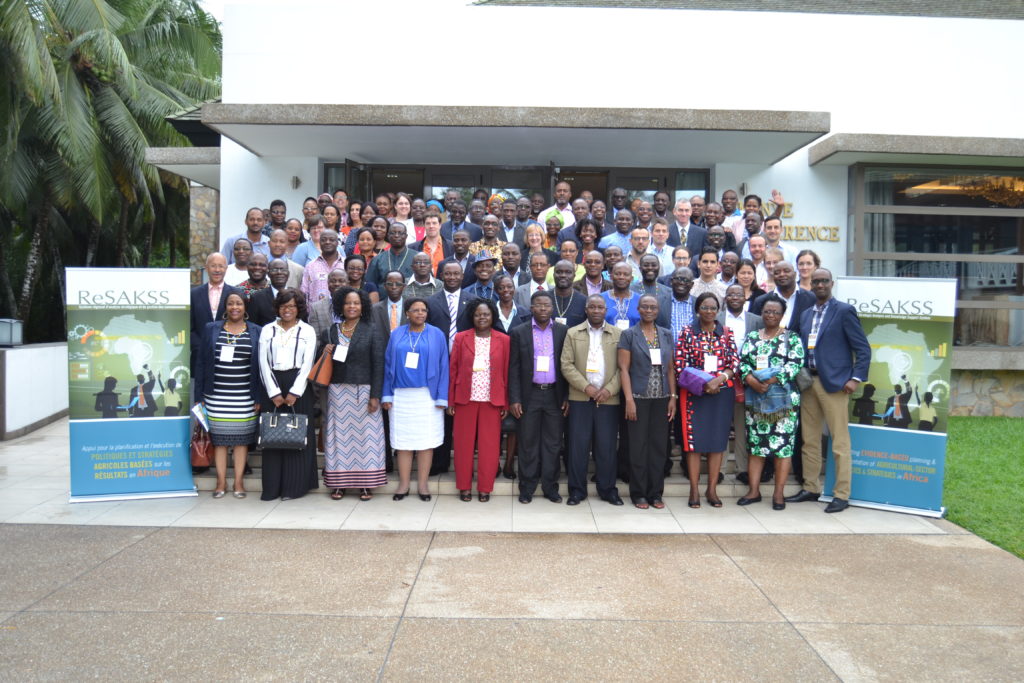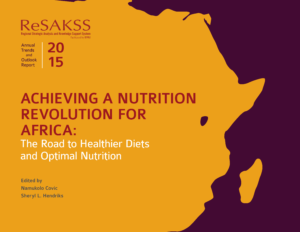ReSAKSS Conference leverages existing initiatives to scale up nutrition in Africa
From 18-22 October 2016, the 2016 Regional Strategic Analysis and Knowledge Support System (ReSAKSS) Annual Conference was held in Accra, Ghana under the theme “Achieving a Nutrition Revolution for Africa: The Road to Healthier Diets and Optimal Nutrition”. The event was convened by the International…
 From 18-22 October 2016, the 2016 Regional Strategic Analysis and Knowledge Support System (ReSAKSS) Annual Conference was held in Accra, Ghana under the theme “Achieving a Nutrition Revolution for Africa: The Road to Healthier Diets and Optimal Nutrition”.
From 18-22 October 2016, the 2016 Regional Strategic Analysis and Knowledge Support System (ReSAKSS) Annual Conference was held in Accra, Ghana under the theme “Achieving a Nutrition Revolution for Africa: The Road to Healthier Diets and Optimal Nutrition”.
The event was convened by the International Food Policy Research Institute (IFPRI), in partnership with the African Union Commission (AUC) and brought together state and nonstate actors to deliberate on key findings of the latest ReSAKSS Annual Trends and Outlook Report (ATOR).
The ATOR examines challenges and opportunities for linking agriculture and food systems to nutrition. Specifically, the conference sought to broaden understanding of the current nutrition situation in Africa with respect to indicators of relevance to the CAADP implementation agenda:
- How can the various initiatives be better leveraged for more rapid progress on nutrition in support of Africa’s development agenda?
- How can the challenges be addressed to enable Africa to meet the nutrition targets it has set for itself?
“Engage with SUN Movement running in 37 African countries, especially with SUN Principles, such as Inclusiveness” #2016ReSAKSS @SUN_Movement pic.twitter.com/EiG6PN6LAS
— Sergio C Teixeira (@cooperteixeira) October 20, 2016
Recent AUC initiatives include the CAADP Nutrition Initiative, the Africa Region Nutrition Strategy 2015–2025 (ARNS 2015–2025), the Africa Task Force on Food and Nutrition Development, the African Union (AU) 2014–2017 Strategic Plan, the African Union Agenda 2063, and the 2014 Malabo Declaration have helped to make nutrition a priority on the continent. In addition, 37 out of 57 countries involved in the Scaling Up Nutrition (SUN) Movement are African. The CAADP process has included efforts by countries—led by the NEPAD Planning and Coordinating Agency (NPCA), the Food and Agriculture Organization of the United Nations (FAO), and other development partners—to mainstream nutrition in national agriculture and food security investment plans. And country-level SUN and CAADP teams are expected to work collaboratively toward improved nutrition. These and other efforts have resulted in some progress on increasing agricultural investment and on improving nutrition indicators such as child stunting and wasting—but if African countries are to meet the Malabo Declaration targets of reducing child stunting to 10 percent and child underweight to 5 percent by 2025, the pace of progress will need to be accelerated.
Read the Conference Note (PDF 411 KB) and visit the ReSAKKS Conference website.
The conference allowed policymakers, researchers, advocacy groups, farmers’ organizations, the private sector, development partners, and other key stakeholders from within and outside of Africa to:
- discuss issues and recommendations raised in the 2015 ATOR—the official CAADP monitoring and evaluation report;
- review progress in implementing the CAADP agenda and in particular progress toward achieving key CAADP goals and targets as well as in creating capacities and adopting effective modalities for evidence-based policy planning and implementation; and
- evaluate progress and challenges in establishing and operationalizing effective country Strategic Analysis and Knowledge Support System (SAKSS) platforms and mutual accountability platforms through agriculture joint sector reviews (JSRs).
Video: 2016 ReSAKSS Annual Conference – Shenggen Fan, Director General of the International Food Policy Research Institute and member of the SUN Movement Lead Group
Video: Introductory Message – Ousmane Badiane, Director for Africa, IFPRI
ABOUT ReSAKSS
Established in 2006 under CAADP, ReSAKSS supports efforts to promote evidence and outcome-based policy planning and implementation as part of the CAADP agenda. ReSAKSS is facilitated by IFPRI, in partnership with the AUC, NPCA and leading regional economic communities (RECs). At the regional level, ReSAKSS is supported by three Africa-based CGIAR centers: the International Livestock Research Institute (ILRI) in Kenya, International Water Management Institute (IWMI) in South Africa, and International Institute of Tropical Agriculture (IITA) in Nigeria.
